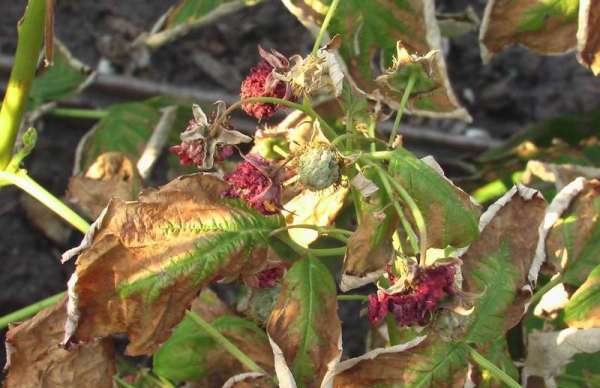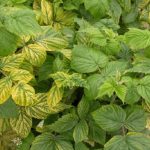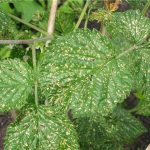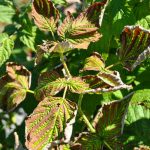Twice a year you can enjoy raspberries. Ripening begins in early summer, the second stage of fruiting - in September, when raspberries can be treated up to the first frost. Raspberry is an unpretentious plant, but it is also susceptible to various diseases. One of the most common - drying leaves, berries and shoots. In this article we will try to understand why berries, leaves dry and what to do in such cases, what are the methods of treatment.
Table of contents
Causes of drying branches and berries
The drying process is called dying out syndrome. The majority of young plants are exposed to it, because with the growth of a bush, young shoots crack. This contributes to the rapid penetration into the interior of the stem of the larvae of insects and phytopathogenic fungi, the main culprits of drying.
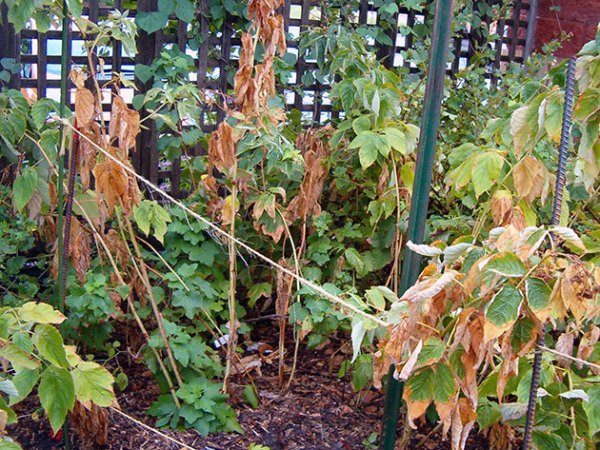
- Disease caused by the reproduction of phytopathogenic fungi, manifested in the death of stems in early spring. After winter, the infected branches slowly grow and dry. If the plant lacks moisture, the process is faster. If you do not take action, you can lose more than half the stems and ovaries of raspberries.
- The culprit infection of raspberry bushes is a shoots gallitsa. Getting through natural cracks, or mechanical damage inside the stem, it lays the larvae, which feed on the bark of the plant and destroy its protective layer - periderm.This is the main barrier that prevents the penetration of phytopathogenic fungi inside the plant.
Shoots become a feeder for the larvae. In the place of their greater accumulation of ulcers appear that prevent the spread of nutrients throughout the plant. This leads to the death of the upper part of the stem. The disease appears as purple or dark brown spots on the shoots..
Why berries dry up?
Drying of raspberry berries is promoted by various viral diseases that spread cicadas and aphids. These sucking insects spread the infection from diseased plants. The diseases are different, but the result is the same for everyone - drying up the berries.
- With viral chlorosis berries develop poorly, do not have time to collect juice and color, eventually dry out.
- With yellow mosaic if the berry does not completely dry up, it develops one-sidedly and has a rather dry, bland taste.
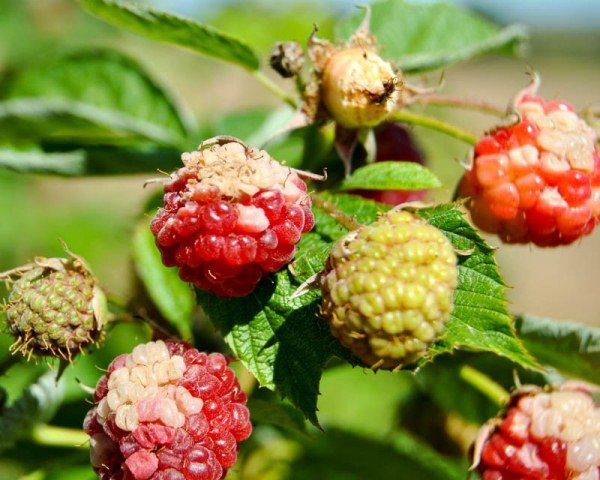
- Curly differs underdevelopment of berries and their drying. Bushes infected by this virus die for several years.
First of all, diseases affect the harvest. Unilateral development of berries, their falloff and drying should be a signal for the start of emergency action.
Why leaves dry and curled during fruiting?
Viral and bacterial diseases of raspberries, spread by flying insects, provoke drying of the leaves, even during fruiting. Diseases that affect the berries, primarily affect the condition of the leaves and their development. The same viruses have a negative effect on the plant and yield:
- Viral chlorosis. Infected leaves begin to turn yellow, dry and curl in the midst of growth and flowering, along with the berries, the shoots become small compared to healthy ones.
- Yellow mosaic. This disease is characterized by yellowing leaves with twisted dry edges. It is an insect-borne virus that manifests itself in late spring and mid-August.
- Curly. To distinguish healthy shoots from patients can be on several grounds:
- slowdown growth;
- thickening in diameter;
- change in leaf color until brown;
- leaf size reduction and their drying.
- Viral chlorosis
- Wanting mosaic
- Curly
What is chlorosis and how to treat it
The disease that often infects a raspberry bush is chlorosis. Him by nature of origin divided into:
- Parasiticwhich is spread by parasites, mainly aphids and mites.
- Non-parasitic, depending on the weather, landing conditions and content.
What a hive affected by this virus looks like:
- yellowing first in the center and then entirely leaves;
- shoots become thinner and drawn out
- the berries are either not formed at allor half of it ripens, and the other half dries.
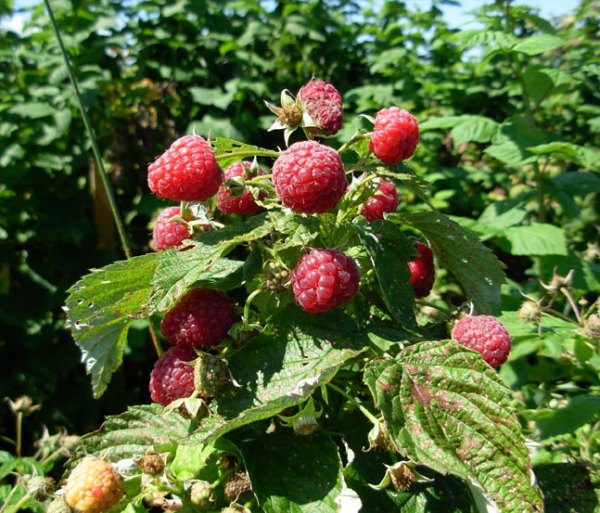
Fight with chlorosis should begin immediately after planting. For this there is a whole a series of means for spraying a plant and protecting it from sucking insects. If you want to harvest this year, then it should be processed in 2 stages:
- In early spring, before blooming of kidneys, use 3% Nitrafen solution or 0.2% Nicotine-sulfate solution.
- Before flowering emulsion 30% Methylmercapthos.
If chlorosis was triggered by adverse weather conditions, cold water irrigation or a lack of organic compounds, you should try Correct the quality of plant care:
- normalize watering with warm water, it is better if it is river or lake, heated by the sun;
- make the soil more fertile due to the introduction of mineral fertilizers;
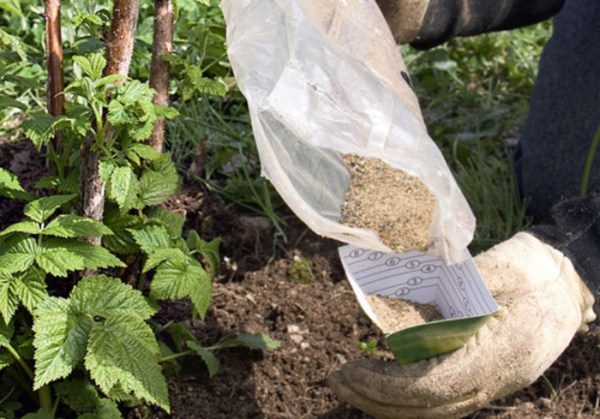
- soften the soil forest floor or peat.
How to protect raspberries from pests and diseases
Mulching is one way to protect. Protecting the roots of the plant, such a surface layer will allow the plant to get stronger and push the process of cracking the stems to a later date, when they become resistant to the disease. The layer of mulch must be removed when the first buds appear. The soil under it is always saturated with moisture, it can cause rotting, dying off of the kidneys and eventually drying out.
If in time to cut the damaged stems, you can save part of the shrub. You need to cut off all areas covered with dark spots and small growths.. It will be better to completely remove the entire "sick" escape.
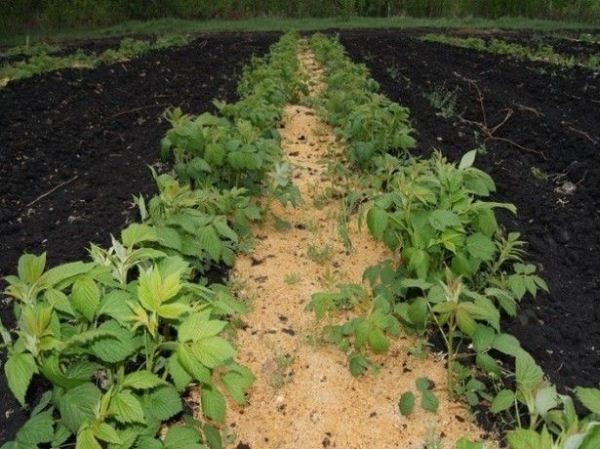
Give the bush to get stronger and grow, will help spraying, which should be carried out in a period of rapid growthat the beginning and in the middle of summer. Subjected to the processing of the lower part of the plant, from the ground level at 25 - 30 cm up. For this, Actellic mixtures are suitable - 0.2%, Fufanon - 0.3% and “Topaz - 0.1%. Fruiting raspberries should be sprayed with the same preparations before flowering and after harvesting. To preserve the integrity of the berries, after flowering, it is necessary to carry out 3 treatments with the “Fitoderm” biological product - 0.3% with an interval of 1 week.
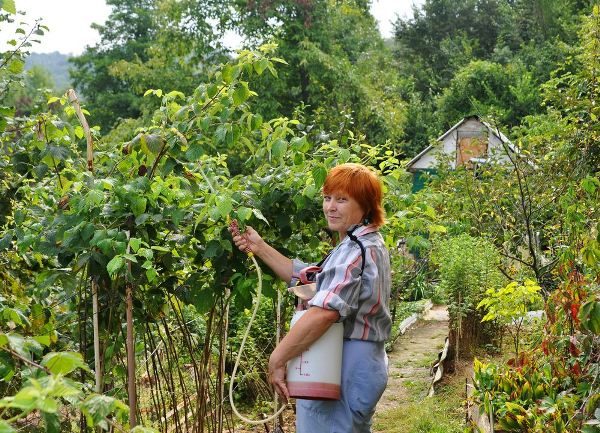
Proper planting of young plants
On how the planting of new bushes, will depend on them resistance to larvae of shoots gall midge and viral diseases.
- Young plants need to be planted in remoteness from old bushesthat may be infected by larvae and fungi.
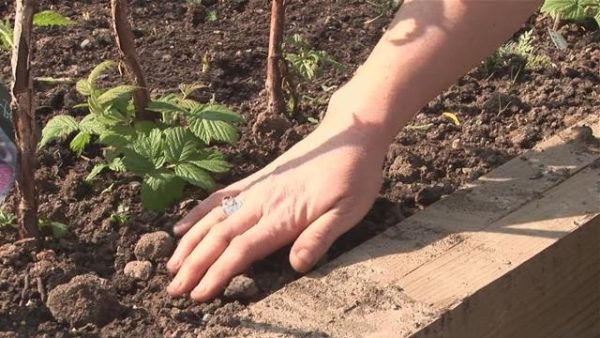
- It is necessary to rinse the roots under the pressure of water and wash out all the soil from them.. Nearby it is recommended to dig a small hole, where water and soil remains will flow. In the roots there may be non-sparse eggs of the shoots midge, which must be neutralized, i.e. to bury.
- After landing completely prune raspberry stalks, even if you land in the spring.
If possible, should cover raspberry nonwoven fabric, to prevent infection by viral infections that spread flying insects.
Once every 2 weeks spray Bordeaux mixture or other chemicals allowed for raspberries. During this period, it is not the high yield that is important, but the strengthening of the stems and protection against pests and diseases.
If you decide to plant raspberry bushes in the garden, it is better to choose varieties resistant to parasites and infections. When buying, pay attention to the root systemwhich may be affected by a virus or insect. An important rule is to make every effort to grow a healthy plant, which will please more than one year with a rich and tasty harvest.
